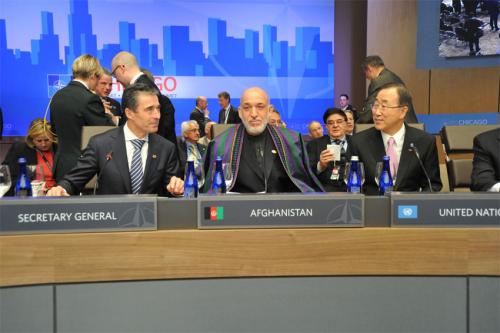At NATO summit, Ban urges commitment to ‘enduring’ support for Afghanistan
While re-affirming the continued engagement of the United Nations in Afghanistan, Secretary-General Ban Ki-moon today urged the country’s international partners to remain committed to supporting the Central Asian nation even as they pull out their troops.

Secretary-General Ban Ki-moon (right), with NATO Secretary-General Anders Fogh Rasmussen and President of Afghanistan Hamid Karzai, at the NATO Summit in Chicago.
“Afghanistan faces clear and difficult security and development challenges – yet our resources are limited, the UN cannot fill all the gaps,” Mr. Ban said in his address to the NATO Summit in the United States city of Chicago. “The enduring commitment of every leader here today will be critical.”
“Let us send an unmistakable signal: Afghanistan’s international partners will not withdraw their support as they draw down their military presence,” he added. “The commitment of neighbours and other countries in the region will be crucial.”
World leaders are attending the Summit to discuss how to complete the NATO-led International Security Assistance Forces (ISAF) mission in Afghanistan by the end of 2014, and how to show their continued commitment to the Afghan people beyond that date.
ISAF, as well as the UN Assistance Mission in Afghanistan (UNAMA), are mandated by the Security Council to operate in Afghanistan, and are present at the request of the Government of Afghanistan. While ISAF, deployed in Afghanistan since the end of 2001, has a peace-enforcement mandate, UNAMA is a political Mission directed and supported by the UN Department of Peacekeeping Operations, with two main areas of operation, development and humanitarian issues, and political affairs.
In his remarks, Mr. Ban said the Summit must reaffirm the timeline for an international troop withdrawal in tandem with the pace at which the Afghan National Security Forces assume responsibilities. It should also provide concrete decisions on funding following that withdrawal.
The UN chief noted that Afghanistan’s security forces must prioritize the protection of civilians, including special measures to protect the human rights of all citizens, particularly women and girls affected by conflict.
“We must focus our efforts more broadly than a technical restructuring of security institutions,” Mr. Ban said. “We must link these efforts within a strategic framework and a social contract that is both inclusive and consultative.”
He cited combating drug production and trafficking, improving health care, education and livelihoods as some of the priorities that must be addressed. He also noted that the Conference on Afghanistan, in the Japanese capital, Tokyo, in July, will take up issues concerning development challenges in Afghanistan, and emphasized that success will rest on the ability of the international community to assist the Afghan people.
“By presenting a clear roadmap and offering clear financial guarantees here today on security –and in July on the socio-economic agenda – we will help to reassure Afghanistan of the international community’s commitment to a peaceful and stable future,” the Secretary-General said.
“At the same time, we recognize the responsibility of the Afghan Government to take the often hard political decisions to fight corruption, enhance performance and improve delivery – all essential to good governance,” he added, stressing the need to continue striving for a genuine and broad-based political reconciliation process, and to reinforce the critical role of women in promoting peace and security.
On the sidelines of the Summit, the Secretary-General met with the President of Afghanistan, Hamid Karzai, on Sunday, as well as other world leaders.
In his meeting with President Karzai, Mr. Ban said the Summit was an important milestone that underscored that the international community will continue to partner with Afghanistan after the withdrawal of the international military forces, according to the UN chief’s spokesperson.
While noting the steps the Afghan authorities have taken on governance, he pointed out that amid a global fiscal crisis donors would continue to link long-term aid with delivery on governance, the spokesperson said, adding that the Secretary-General reiterated the readiness of the United Nations to provide support to the Afghan authorities to produce credible and democratic elections.
Source: UN NEWS
- 439 reads
Human Rights
Fostering a More Humane World: The 28th Eurasian Economic Summi

Conscience, Hope, and Action: Keys to Global Peace and Sustainability

Ringing FOWPAL’s Peace Bell for the World:Nobel Peace Prize Laureates’ Visions and Actions

Protecting the World’s Cultural Diversity for a Sustainable Future

Puppet Show I International Friendship Day 2020

